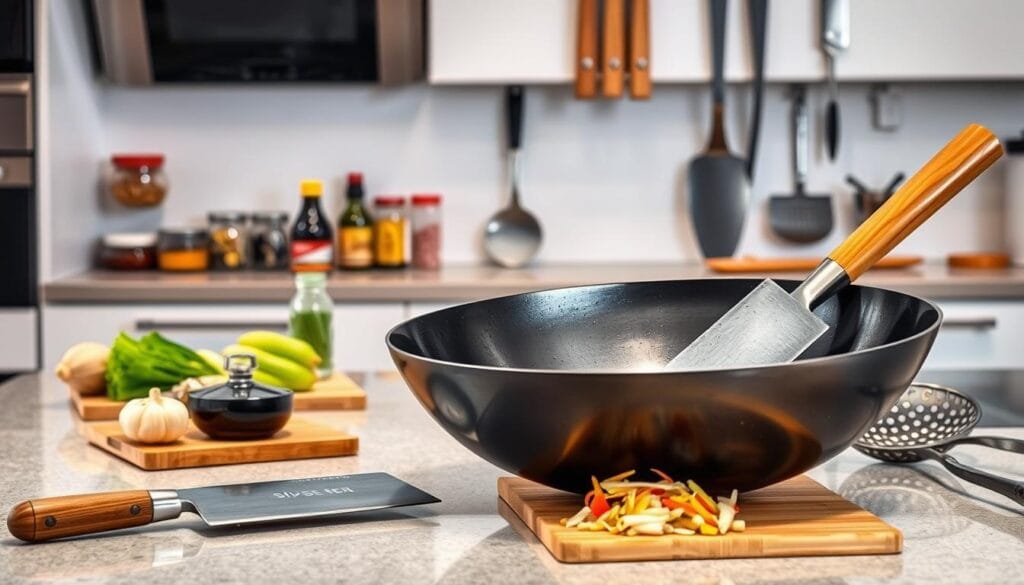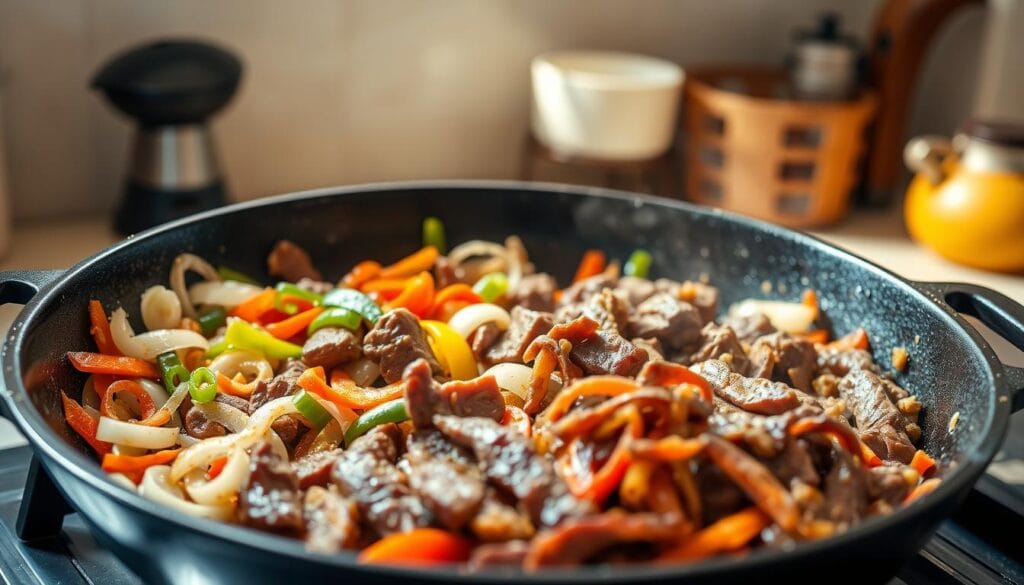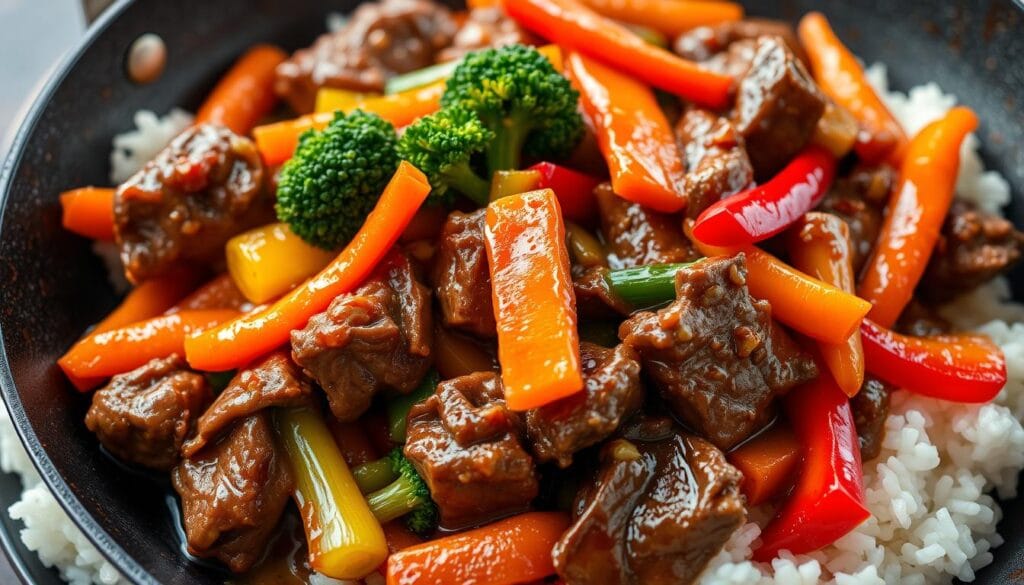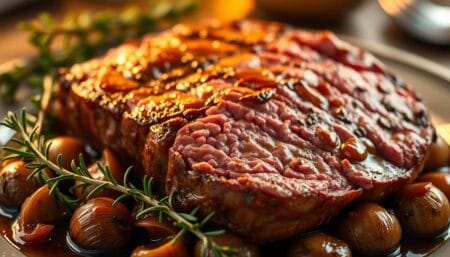Growing up in a busy kitchen taught me that quick meals can be the best. TheLearn how to make delicious Beef and Veggie Stir-Fry in minutes. Quick prep, healthy ingredients, and bold flavors for busy weeknights. is my favorite comfort dish. It turns simple ingredients into a masterpiece.
Stir frying is more than cooking; it’s an art. It combines lean protein and colorful veggies in minutes. This method lets home cooks make top-notch meals fast, without long hours in the kitchen.
If you’re always on the go, this beef stir fry recipe is perfect. It’s quick, nutritious, and delicious. With fresh ingredients and fast cooking, it’s a meal that fills you up and delights your taste buds.
Learning a few stir frying techniques can make you a better cook. You can make a beef and vegetables dish that looks and tastes like it came from a restaurant. Let’s explore stir frying and make a great meal in no time.
Table of Contents
Essential Ingredients for the Perfect Beef with Vegetables
Making a great beef and vegetable stir fry starts with picking the right ingredients. The quality and mix of these parts make a dish unforgettable. From tender beef to fresh veggies and spices, each part is key.
Best Cuts of Beef for Stir-Frying
Choosing the right beef cut is crucial for a tasty dish. Here are some top picks:
- Flank Steak: Lean and full of flavor, cooks fast
- Sirloin: Tender and easy to slice thinly
- Ribeye: Rich in fat for extra juiciness
- Tenderloin: Extremely soft and cooks quickly
Fresh Vegetable Selection Guide
The right mix of colorful veggies makes a vegetable beef soup or stir fry pop. Here are some great choices:
| Vegetable | Cooking Time | Flavor Profile |
|---|---|---|
| Bell Peppers | 2-3 minutes | Sweet, crisp |
| Broccoli | 3-4 minutes | Earthy, slightly bitter |
| Snap Peas | 1-2 minutes | Crunchy, fresh |
| Carrots | 2-3 minutes | Sweet, tender |
Sauce and Seasoning Components
The secret to a memorable beef and vegetable stir fry is its sauce. Key ingredients include:
- Soy sauce for depth
- Garlic for intensity
- Fresh ginger for warmth
- Sesame oil for nutty undertones
- Rice vinegar for brightness
By choosing your ingredients wisely, you’ll make a dish that’s both healthy and tasty.
Kitchen Tools and Equipment Needed

To make the perfect beef and vegetable stir fry, you need more than just great ingredients. The right kitchen tools can make a big difference. They can turn your cooking into a top-notch experience.
Here are the essential tools for your stir fry:
- Wok or Large Skillet: This is the key to a great stir fry. A carbon steel or cast-iron wok spreads heat well and adds a nice seared flavor.
- Sharp Chef’s Knife: It’s vital for cutting beef and veggies into thin, even slices. This ensures they cook evenly.
- High-Heat Spatula: Use a wooden or heat-resistant silicone spatula for stirring and flipping.
- Measuring Cups and Spoons: These help you measure sauce ingredients accurately.
Some optional tools can also help improve your stir fry:
- Wok Ring: It keeps your wok stable on the stovetop.
- Meat Slicer: This tool helps you get very thin beef cuts.
- Instant-Read Thermometer: It ensures your meat is cooked to the right temperature.
Quality tools make stir fry prep easier and more fun. While not all tools are necessary, the right ones can greatly enhance your cooking skills and dish quality.
Preparation Tips for Restaurant-Quality Results
Creating a great beef and vegetable curry or casserole starts with careful preparation. Professional chefs know that great cooking begins long before the first ingredient is added. The right techniques can turn an ordinary meal into a dish fit for a restaurant.
Mastering Meat Slicing Techniques
Slicing beef for stir-fries, casseroles, or curry needs precision. Follow these important tips:
- Chill the meat for 15-20 minutes to make cutting easier
- Use a sharp knife with a thin, long blade
- Cut against the grain to ensure tenderness
- Aim for uniform pieces around 1/4 inch thick
Vegetable Cutting Mastery
Different cutting methods can change your dish’s texture and cooking time. Consistency is key when preparing vegetables for any recipe.
- Julienne cuts for quick-cooking vegetables
- Diagonal slices for visual appeal
- Uniform size ensures even cooking
- Keep pieces similar in size for balanced results
Mise en Place: The Secret to Smooth Cooking
Professional chefs love mise en place – a French term meaning “everything in its place”. This preparation method makes cooking your beef and vegetable curry or casserole smooth.
- Gather all ingredients before starting
- Chop and measure everything in advance
- Arrange ingredients in order of use
- Clean as you go to maintain workspace efficiency
Step-by-Step Cooking Instructions

Making a perfect beef and vegetable skillet needs care and skill. Follow these steps to turn simple ingredients into a tasty dish. It will wow your family and friends.
- Prepare Your Cooking Space
- Heat a large wok or skillet over high heat
- Add 2 tablespoons of high-smoke-point oil
- Make sure all ingredients are pre-chopped and ready
- Cook the Beef
- Sear beef strips for 2-3 minutes
- Remove meat and set aside to prevent overcooking
- Keep the meat slightly rare for tender results
- Stir Fry the Vegetables
- Add vegetables to the hot skillet
- Stir continuously for 3-4 minutes
- Maintain crisp texture and vibrant colors
- Combine and Finish
- Return beef to the skillet
- Pour prepared sauce over ingredients
- Toss quickly to coat evenly
- Cook for additional 1-2 minutes
Your beef and vegetable stir fry recipe is now ready to serve. The secret is to cook at high heat and quickly. This keeps the meat tender and the vegetables crunchy.
Mastering the Stir-Fry Technique
Perfecting beef stir fry is more than just tossing ingredients. Professional chefs know technique makes meals special. Whether it’s beef and vegetable kebabs or a classic stir-fry, knowing the basics can improve your cooking.
Stir-frying is an art that needs precision and practice. It started in Chinese cuisine but now it’s loved worldwide for quick, healthy meals.
Heat Control Basics
Stir-frying needs high, steady heat. Your pan should be hot enough to quickly sear meat without overcooking. Here are a few tips to keep the heat right:
- Use a heavy-bottomed wok or skillet
- Preheat your cooking surface for 2-3 minutes
- Watch for a light smoke indicating perfect temperature
Proper Wok Movement
Mastering wok technique means moving ingredients smoothly. You want to keep everything moving to cook evenly and avoid burning. Try a gentle tossing motion that lifts and rotates food fast.
Timing and Sequence
When you stir-fry beef, the order of ingredients is key. Here’s the best order:
- Sear meat first
- Remove meat temporarily
- Cook harder vegetables
- Add softer vegetables
- Return meat to pan
- Add sauce and finish cooking
With practice, you’ll make simple ingredients into amazing beef and vegetable kebabs. They’ll impress your family and friends.
Nutritional Benefits and Dietary Information
Beef with vegetables is more than just a meal. It’s a blend of lean protein and various vegetable nutrients. This mix makes it a balanced and healthy choice.
This dish has many nutritional advantages over traditional vegetable beef soup. Some of these benefits include:
- High-quality protein for muscle maintenance
- Essential vitamins and minerals from fresh vegetables
- Lower calorie content due to stir-frying technique
- Reduced sodium compared to canned soup alternatives
Different dietary needs can be met with simple changes. Gluten-free diners can use tamari instead of soy sauce. Low-carb enthusiasts can add more veggies for extra nutrition.
Beef with vegetables has about 20-25 grams of protein per serving. This makes it great for those watching their macronutrients. The quick stir-fry method also keeps more nutrients than longer cooking times.
Nutritional variety is important. Broccoli, bell peppers, and carrots add color and key nutrients like vitamin C, vitamin A, and potassium to your meal.
Storage and Leftover Management
Keeping your beef and vegetable skillet tasty means using the right storage and reheating methods. Whether it’s a big casserole or a quick stir-fry, knowing how to store and reheat is key. It helps keep the flavors good and ensures food safety.
Proper Cooling Methods
Cooling your dish fast is important to keep its quality. Here’s what to do:
- Let the dish cool to room temperature in 2 hours after cooking
- Split big portions into smaller ones for quicker cooling
- Use shallow containers to help heat spread out faster
- Don’t cover the dish until it’s completely cooled
Reheating Guidelines
Here’s how to make your leftover beef and vegetable casserole taste like new:
- Stovetop Method: Heat it in a skillet over medium, stirring often to avoid burning
- Microwave Technique: Heat on medium, stirring every 30 seconds for even heating
- Add a bit of broth or water to keep it moist
- Make sure it heats up to 165°F for safety
Tip: Turn your leftover beef and vegetable skillet into something new. Use it in omelets, as a rice topping, or in a quick breakfast hash.
Conclusion
Making a tasty beef and vegetable stir fry is more than cooking. It’s an art that mixes nutrition, skill, and creativity. By knowing the key ingredients, mastering cutting, and controlling heat, you can make amazing meals fast.
Stir fries are super versatile. You can change ingredients based on what you like, what’s in season, or your diet. Whether you’re in a hurry or love trying new flavors, stir fries are perfect for you.
Getting better at stir fries takes practice. Start with a basic recipe, try different veggies, and find your own style. Great cooking is about enjoying the journey and sharing good food with others. Your cooking skills will grow with each dish you make.
Ready to improve your cooking? Get your wok, cut your ingredients well, and start a tasty journey. Your perfect stir fry is just waiting for you!




